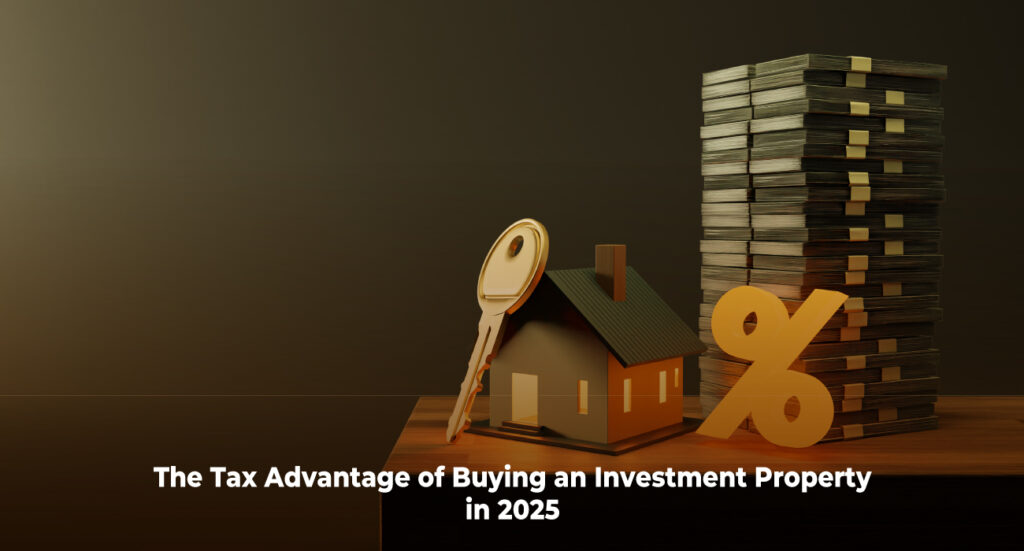Is Now a Good Time to Buy an Investment Property? Why the Right Advisors Matter in 2025
Doubt is one of humanity’s oldest emotions. We question every major decision—especially when it involves our hard-earned money. And when it comes to property investment, the first thing we often do is look for someone who’s done it before.
But here’s the catch: if you speak to someone who failed in property investment, they’ll probably warn you it’s the worst decision you could ever make. On the flip side, those who’ve done well tend to stay quiet—they don’t want to jinx it. It’s a bit like marriage. If you’re unhappy, you’ll shout it from the rooftops. But if you’re blissfully content, you keep it low-key—just in case the universe is listening.
As someone who works closely with property investors every day, I’ve seen both sides. Some clients are high fiving their way to financial freedom. Others are stuck in cashflow nightmares so deep, they’re asking to pay their accounting fees in instalments.
This article isn’t about hyping up property or talking it down. It’s about offering a balanced view from the front lines—what’s really happening in today’s market, who should be cautious, and who might be in the right position to take the plunge.

Where Are We Now?
Let’s talk about where we’re really at.
The headlines are buzzing with talk of interest rate cuts, slowing inflation, and house prices creeping up again. But what does that actually mean for someone thinking of buying an investment property in 2025?
The recent 25 basis point rate cut by the RBA was no surprise — inflation has cooled, and there’s still no sign of a wages breakout. While it may not feel like a big deal at first glance, that rate cut brings average mortgage rates down to around 5.81%, giving borrowers a bit of breathing room. That small shift could save someone with a $750,000 loan about $80 a month — not life-changing, but helpful.
But before we get excited about a buying frenzy, let’s be clear: this isn’t another boom. Affordability is still a big issue. According to CoreLogic, despite two rate cuts, we’re still in what economists call “restrictive territory.” And for the average Aussie household, the median income no longer buys the median home. Buyers are being pushed to the outer suburbs and fringe markets, where homes are a little more within reach.
In fact, it’s the lower quartile of the market — the more affordable end — that’s leading the charge in price growth. Outer suburbs of Sydney, Melbourne, Brisbane, and Perth are seeing double-digit annual gains, while inner-city growth remains subdued.

Who Should Be Buying Right Now?
Not everyone should rush out and buy an investment property just because rates have dipped and prices are climbing again. In fact, the truth is a bit more nuanced.
Right now, the people best positioned to buy are those with a long-term mindset, strong borrowing capacity, and solid buffers in place. These are the investors who aren’t relying on short-term capital growth to make a profit — they’re playing the slow game. They understand that buying property isn’t about timing the market perfectly, it’s about time in the market.
If your cashflow is healthy, your job or business income is stable, and you’re not stretching yourself to the limit with loan repayments, now could be a smart time to step in. Especially if you’re targeting areas with growing demand and limited supply — like outer suburban markets where price growth has been strong, but entry prices are still relatively accessible.
On the other hand, if you’re feeling the pinch from rising living costs, or you’re already juggling debt, buying an investment property might only add pressure. Property is a long-term commitment — it’s not something you want to “try out” and walk away from when things get tough.
The key? Don’t base your decision solely on what the market’s doing today. Focus on your own numbers, your own goals, and your ability to hold the property through all market cycles.

The Tax Advantage of Buying an Investment Property in 2025
Yes, interest rates are still higher than we’d like. But here’s something that doesn’t get said enough — if you’re a salaried employee in Australia, you don’t have many levers to legally reduce your tax bill. You can claim a few deductions here and there — maybe some work-from-home expenses, a bit of car mileage, or a laptop. But none of it really moves the needle.
An investment property, on the other hand, gives you access to some of the most powerful tax deductions available to individuals. We’re talking about interest on your loan, property management fees, insurance, depreciation, maintenance costs — and if you’re negatively geared, even your paper losses can reduce your taxable income.
So, if you’re in a position to buy but you’re still sitting on the fence waiting for the “perfect time,” ask yourself this: how much tax are you paying while you wait? Because every year you delay, you could be handing tens of thousands of dollars to the ATO that could have been working for you through a well-chosen property.
Sure, timing the market sounds smart in theory. But in reality, most successful investors aren’t market timers — they’re market participants. They buy well, they hold long-term, and they let time and tax benefits do the heavy lifting.

Should I Use a Buyer’s Agent?
As acquiring an investment property in Australia’s major cities slowly becomes out of reach for many everyday investors, we’re seeing a growing trend: investors are heading to the outskirts — or even interstate — in search of better value and stronger returns.
From what we’ve observed as property tax accountants, those who invest outside their local area or home state tend to do far better when they work with a qualified buyer’s agent. Why? Because they’re not relying on guesswork, emotion, or a rushed weekend inspection in a suburb they’ve never visited. Instead, they’re getting boots-on-the-ground research, data-backed negotiation, and someone to advocate for their long-term success — not just a quick win.
Buyer’s agents know which suburbs are gentrifying, where infrastructure projects are going in, and which areas have rental demand but tight supply. They can help you avoid traps — like overpaying, picking a poor location, or falling in love with a “pretty” property that won’t perform.
That said, not all buyer’s agents are created equal. If you’re going to use one, choose someone with proven investment experience, who’s independent from selling agents, and who understands your strategy — whether that’s yield, growth, renovation, or development.
Think of a buyer’s agent as part of your team. In a market that’s shifting quickly and unevenly, having the right people in your corner can make the difference between a confident purchase and a costly mistake.

Importance of Using an Experienced Mortgage Broker
When it comes to financing an investment property, the loan structure matters just as much as the interest rate — especially when tax deductions are on the line. Yet, many investors still walk into a bank and deal directly with staff who focus on product, not strategy. We’ve seen this go wrong far too often: loans bundled incorrectly, redraws used instead of offset accounts, or refinancing done without any consideration of how the loan purpose ties back to deductible interest.
That’s where an experienced mortgage broker makes all the difference. A good broker doesn’t work in isolation — they actively engage with your accountant, especially during refinancing, to ensure the loan setup supports your tax strategy and doesn’t create a deduction nightmare later. This kind of collaboration is rarely seen when working with bank employees, who often lack the broader financial planning context.
A quality broker understands property investment and knows when to seek input from your accountant to structure the loan in a way that supports your long-term tax deduction strategy. They stay on top of shifting lending policies, help optimise your borrowing capacity, and recommend lenders that align with your investment goals — whether that’s focused on capital growth, strong rental yield, or future portfolio expansion.
In today’s lending environment, where a small error can have long-term tax consequences, an experienced mortgage broker is not just helpful — they’re essential to your team.

Conclusion: Dreams Don’t Die — People Just Stop Working for Them
If you’ve managed to read until here, it means the dream of building wealth through property is still alive in you. What often fades isn’t the dream itself — it’s the action. The planning. The willingness to start, even when things don’t feel perfect.
Success in property investing doesn’t come from wishful thinking or waiting for the stars to align. It comes from having a plan, understanding your numbers, and building a strategy that works for you. Whether it’s your first investment or your fifth, what matters most is progress — not perfection.
Wealth creation and wealth protection are the cornerstones of financial freedom. And in Australia, property remains one of the most powerful tools to achieve both. Unlike other investments, property allows you to leverage the bank’s money to grow your asset base — something few other strategies can offer at this scale.
But it’s not just about buying property. It’s about buying smart, holding with purpose, and managing your cashflow and tax outcomes along the way. That’s where planning makes all the difference — it turns a risky gamble into a calculated move.
So don’t let uncertainty kill your momentum. Your dream doesn’t need to die — you just need to keep working for it. If you’re ready to explore your next move, speak to one of our property tax specialists at Investax. We work with investors across Australia to help turn strategy into action — and action into long-term financial growth.
General Advice Warning
The material on this page and on this website has been prepared for general information purposes only and not as specific advice to any particular person. Any advice contained on this page and on this website is General Advice and does not take into account any person’s particular investment objectives, financial situation and particular needs.
Before making an investment decision based on this advice you should consider, with or without the assistance of a securities adviser, whether it is appropriate to your particular investment needs, objectives and financial circumstances. In addition, the examples provided on this page and on this website are for illustrative purposes only.Although every effort has been made to verify the accuracy of the information contained on this page and on our website, Investax Group, its officers, representatives, employees and agents disclaim all liability [except for any liability which by law cannot be excluded), for any error, inaccuracy in, or omission from the information contained in this website or any loss or damage suffered by any person directly or indirectly through relying on this information.
Reference
CoreLogic – Monthly Housing Chart





